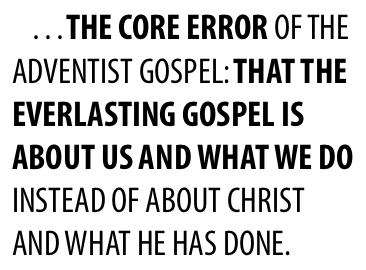Fundamental Belief #14: The church is one body with many members, called from every nation, kindred, tongue, and people. In Christ we are a new creation; distinctions of race, culture, learning, and nationality, and differences between high and low, rich and poor, male and female, must not be divisive among us. We are all equal in Christ, who by one Spirit has bonded us into one fellowship with Him and with one another; we are to serve and be served without partiality or reservation. Through the revelation of Jesus Christ in the Scriptures we share the same faith and hope, and reach out in one witness to all. This unity has its source in the oneness of the triune God, who has adopted us as His children.
Like many of the Seventh-day Adventist Fundamental Beliefs, the biblical accuracy of this belief statement depends entirely on the context of the claims. In this case, the key issue is the Adventists’ meaning of the word “church”, or the “body of Christ”. We saw in our discussion of Fundamental Belief statements 12 and 13 that Adventism has private definitions for interpreting “church”. Their official publication Seventh-day Adventists Believe reveals that the phrase “visible church” is code language for the Adventist church which, they say, is “characterized by loyalty to God’s command- ments and possessing the faith of Jesus”.1
Therefore, it isn’t surprising to find nearly identical language describing this statement about unity in the body of Christ:
Diversity of gifts does not mean a diversity of beliefs, however. In the last days God’s church will be composed of a people who share a platform of the everlasting gospel—their lives characterized by the observance of the commandments of God and the faith of Jesus (Rev. 14:12). Together they proclaim to the world God’s invitation to salvation.2

According to Adventism, the “last days” described here mark the time—now—of the “Third Angel’s message” in which true believers are warned against receiving the mark of the beast, or “Sunday worship”. This call to avoid the mark of the beast and to worship on the seventh day is the heart of the Adventist “everlasting gospel” and the “observance of the commandments of God”. Thus there is no room for unity in Christ with believers from other churches, because there would be diversity of beliefs. Within Adventism, the unity in the body of Christ (i.e. the church) is limited to those who belong to the Seventh-day Adventist Church which they believe is the only true church—the Remnant Church.
The previous quote also shows the core error of the Adventist gospel: that the everlasting gospel is about us and what we do instead of about Christ and what He has done. Thus this statement elaborates on the “platform of the everlasting gospel” as being a life “characterized by the observance of the command- ments of God and the faith of Jesus”.
Therefore, as we look under the surface of what appeared on the surface to be a biblically accurate teaching of the unity that all believers share because of their common faith, we see that it is actually another case of Adventist double-speak. Adventists believe that they have been uniquely set apart from everyone else with the special mission to call true believers into their church.
The only unity envisioned in this statement is a unity under the umbrella of the Seventh-day Adventist organization and in agreement with its doctrines.†
Endnotes
- Seventh-day Adventists Believe, second ed., Pacific Press Pub. Assn., p. 171.
- Ibid., p. 204-205.
- Prayers for Spiritual Unity Answered! - March 20, 2025
- Our Journey Out of Adventism - July 27, 2023
- 30. Adventism’s New Earth - July 27, 2023
